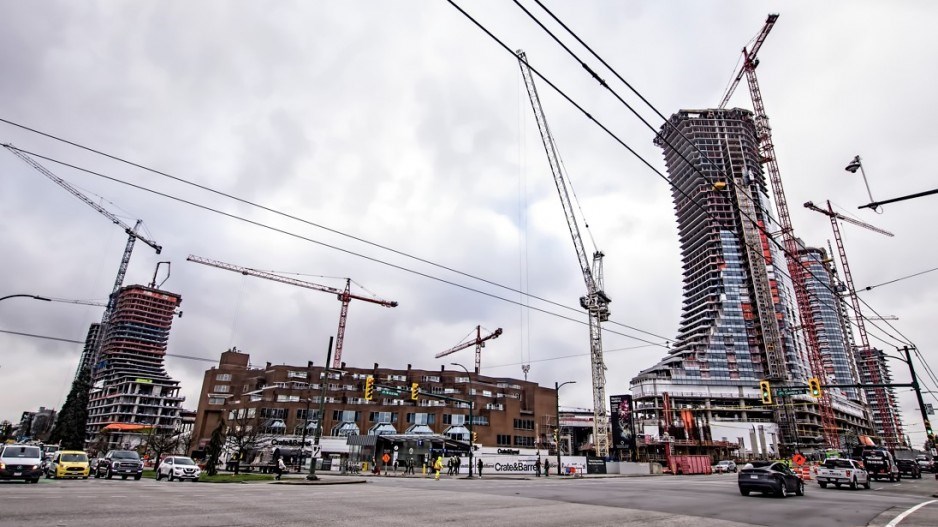New polling from Research Co. shows that 52 per cent of Metro Vancouverites believe that housing is the foremost issue in the region, dwarfing the economy and public safety which are tied at a very distant second.
Even in the historically hipster City of Vancouver, only four per cent of residents rate the environment as their most important issue. Residents aged 18-34 find themselves not just squeezed by housing, but its downstream effects on the general cost of living as well: 30 per cent of them believe the economy is the top issue.
Across all ages, genders, parties and regions, residents of Metro Vancouver agree on who deserves the most blame for the housing crisis: the federal government (44 per cent). Federal Conservative Leader Pierre Poilievre has successfully defined the issue as Prime Minister Justin Trudeau’s cross to bear, but B.C. Conservative Leader John Rustad can take solace in the 33 per cent of Metro Vancouverites who believe the provincial government is more responsible. Compared to the other two levels, municipal governments sail under the radar at 23 per cent.
What explains the anger directed towards the federal government? Immigration’s double-digit lead as the foremost cause of the housing crisis should explain it.
At 29 per cent across the region, this proportion rises to 38 per cent in diverse Surrey and White Rock. Interestingly, the assignment of blame also tracks with age. The older you are, the more likely you are to blame immigration and the 16-year BC Liberal government. The younger you are, the more likely you are to blame interest rates and the decisions of the governing BC New Democratic Party (NDP).
With most Metro Vancouverites believing that the crisis is of federal making, it should come as no surprise that they think the solutions lie on that level as well. More than two in five residents (41 per cent) believe significantly reducing immigration would be the most effective way to solve the housing crisis. This number reaches a high of 49 per cent among 2020 BC Liberal voters and those aged 55 and over.
However, the youngest adults are the least likely to believe in the effectiveness of reducing immigration. Among this age group, one finds greater support for both interventionist and deregulatory solutions: 30 per cent believe a public builder would be the most effective in addressing the crisis, while 25 per cent think rezoning cities will garner further progress.
Another solution that has entered the lexicon recently is the so-called “carrot-and-stick” approach, deployed by BC NDP Leader David Eby to incentivize new housing construction.
Municipalities willing to co-operate with the province’s housing targets have been given additional funding for infrastructure and amenities, whereas those dragging their feet may have their funding withheld. With the City of Vancouver having dealt with a simmering housing crisis for decades, it comes as no surprise that residents there feel the most positive towards this policy. Surrey and White Rock, having seen rapid development since the turn of the century and having done their part in densification, are the most suspicious of having funding withdrawn.
The province’s other flagship housing policy is mandating densification. While Bill 47 raises the minimum height for buildings near transit hubs far above past municipal standards, just getting buildings six storeys or higher built has long been a topic of fierce debate in Metro Vancouver. Nowadays, Research Co. found that 59 per cent of Metro Vancouverites are at peace with buildings that tall on their very block. While two-thirds of those aged 18-34 (68 per cent) are comfortable with the notion, older generations are less amenable to the idea. Curiously, the survey’s largest gender gap is found on this question: more men (68 per cent) than women (50 per cent) welcome the idea. We also find majority support among all regions, except the North Shore.
Two years after Eby became premier, and two days out from a tight provincial election, the crucial battleground of Metro Vancouver is still stressed about housing. While the BC NDP have spent much of the election cycle cursing Poilievre for attaching rocket boosters to their B.C. Conservative opponents, the federal leader’s focus on Trudeau, and Eby’s constant announcements on housing seem to be keeping the heat off of the provincial incumbents for now. As immigration climbs in salience, whoever forms the government after Saturday should brace themselves for discussions with Ottawa on how to manage population growth in the near future.
Hugh Chan is a second year student at UBC studying International Relations and Data Science. You can find more coverage of the 2024 BC election as well as politics across East Asia and the Anglosphere at https://x.com/shxnhugh.
Methodology: Results are based on an online survey conducted from Oct. 10-14, 2024, among a representative sample of 700 adults in Metro Vancouver. The data has been statistically weighted according to Canadian census figures for age, gender and region in Metro Vancouver. The margin of error—which measures sample variability—is +/- 3.7 percentage points, 19 times out of 20.




